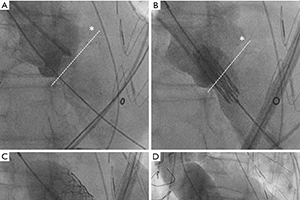Outcomes after transcatheter valve-in-valve implantation using a balloon-expandable Edwards Sapien valve in patients with degenerated Freestyle aortic bioprosthesis
Abstract
Background: Transcatheter aortic valve-in-valve implantation (ViV TAVI) in degenerated Medtronic Freestyle aortic bioprosthesis (FSB) has been reported as being technically challenging. This study sought to evaluate procedural data and outcomes after ViV TAVI using a balloon-expandable Edwards valve in patients with failed FSB.
Methods: Between August 2014 and December 2020, twenty-seven consecutive patients underwent ViV TAVI for symptomatic FSB failure at our institution using a Sapien XT (n=1) and Sapien 3 (n=26) valve, respectively. Endpoints were defined according to the Valve Academic Research Consortium-2 (VARC-2) criteria and were retrospectively analyzed.
Results: Mean patient age was 75.7±8.2 years (female n=5, male n=22); Society of Thoracic Surgeons Predicted Risk of Mortality score was 7.3%±6.2%. ViV implantation with correct positioning of the Edwards Sapien valve within the FSB was successful in all cases. Intraprocedural transesophageal echocardiography revealed none/trace paravalvular regurgitation in twenty-five patients (92.6%), mild paravalvular regurgitation was present in two patients (7.4%). Neither of the patients had a mean gradient ≥20.0 mmHg excluding significant patient-prosthesis mismatch. Three early deaths (≤ thirty days) occurred resulting in a device success rate of 88.8%. One-year and three-year survival rates for patients alive beyond day thirty after ViV TAVI were 95.8% and 70.0%, respectively.
Conclusions: ViV TAVI with Edwards Sapien valves lead to acceptable functional results in high-risk patients with degenerated FSB but early complications must be considered particularly during hospital stay.
Cover






